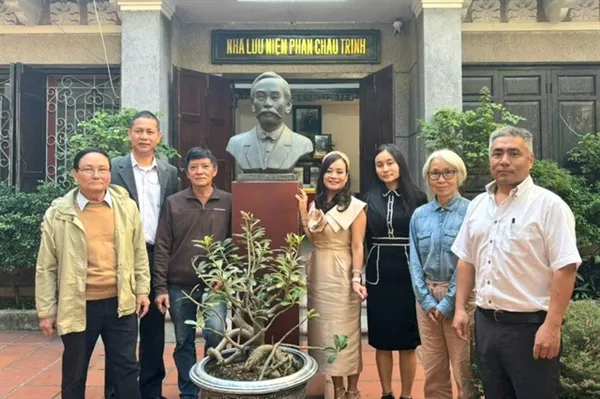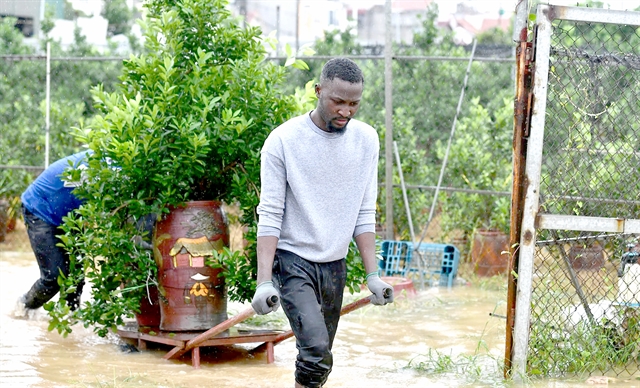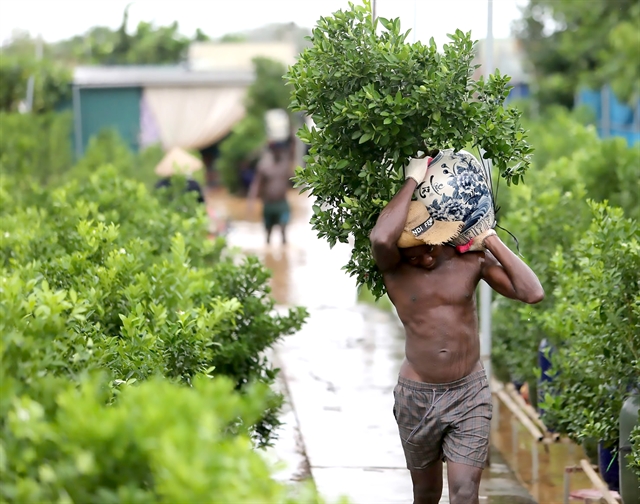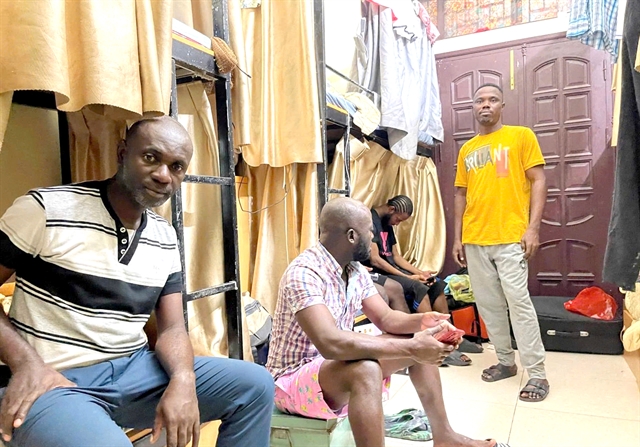 Expat Corner
Expat Corner

By Hương Quỳnh
African workers have become a familiar sight in Hà Nội's Nhật Tân and Tứ Liên wards, often seen doing manual labour like washing dishes and assisting at local peach blossom and kumquat bonsai gardens.
There are at least 150 African expats -- men and women, and sometimes their children -- in the community, most of them hailing from countries like Nigeria, Ghana and Somalia.
Originally here to teach English, most of the Africans turned to manual labour after struggling to find work due to misconceptions about their skills.
 |
| Muideen from Nigeria was hired to transport plants in Tứ Liên village during the Yagi storm. VNS Photo Hoàng Hà |
Language centres in Việt Nam prefer native English speakers, limiting job opportunities for others -- despite the fact that English is the official language of both Nigeria and Ghana, and is widely spoken there, often as a first language.
Some of the African workers came to Việt Nam hoping for a better life, fleeing hardships in their home countries.
At 42, Manfred Fregene has worked as a porter since arriving here in May.
 |
| African people have good health. VNS Photo Hoàng Hà |
He earns two dollars an hour, barely covering food for his eight children, five boys and three girls, ranging in age from one to 16.
He used to work in real estate in Nigeria, but in recent years, the economic downturn and lack of security forced him to leave.
Seeking a safer life, he planned to move his family to Canada, but eventually chose Việt Nam instead.
"My friends in Việt Nam told me it's a safe and livable country, so I decided to come here and start a new life," he said.
Renting a room in a three-story house with a dozen compatriots helps ease his family's homesickness.
Just 500 metres from Fregene’s place, 46-year-old Deborah from Nigeria came to Việt Nam with hopes of a better income to transform her life.
After five months in Việt Nam, Deborah found a job teaching English in Thái Bình, earning 18 dollars per hour.
A few months ago, the centre declined to renew her contract, despite her visa being valid for nearly two more years.
Deborah now rents a room in Tây Hồ while job hunting.
During this time, she took on various jobs, from plastering to unloading and cleaning.
Nguyễn Thị Thảo, owner of a restaurant on Tứ Liên Street, helps the expats by offering them dishwashing and prep work in exchange for meals.
Occasionally, when locals need help with lifting, construction work or farm labour, she refers the workers to them.
She communicates with them entirely through a translation app on her phone.
"They are friendly, many are kind-hearted, but the language barrier makes communication difficult," she said.
Đỗ Ngọc Hạnh, 36, the owner of a local housing complex, said that to support unemployed Africans, he and a few friends created a Zalo group to share job opportunities.
 |
| Labourers from Congo rent rooms in Tây Hồ District. VNS Photo Nguyễn Ngoan |
People like Fregene and Deborah, struggling to support their families, are eager and hardworking job seekers.
But employers say other African expats are reluctant to work, often late, and have been deceived in the past, leading them to bargain, which frustrates their bosses.
A Tứ Liên resident says he has hired African workers to help with house construction and repairs even though most have no training or experience in such work.
"I mainly hire them to practice my English, but for efficient work, I would hire Vietnamese workers," he said.
A drawback of these workers is that they are less skilled and nimble than the locals, often demanding higher wages than the average rate.
An official from the Tây Hồ District People’s Committee acknowledges that several Africans have been living in the area for some time.
Since they have not been able to secure jobs matching their qualifications, they have taken on various manual tasks and odd jobs, the official says.
"Managing this group of workers is challenging because they do not have steady employment," they said.
 |
| The two sides agreed on a wage of approximately four dollars per person per hour, with lunch provided. VNS Photo Quang Hùng |
The district has been in contact with the relevant embassies to gather more information about these workers.
For those with expired visas, authorities are compiling data and planning their repatriation.
Kiều Thanh Nga from the Institute of South Asia, West Asia and Africa Studies (Việt Nam Academy of Social Sciences) explained that due to economic difficulties in some African countries, workers often seek employment abroad, including in Việt Nam, in search of better income and living conditions.
Authorities should conduct regular and thorough checks on workers' status and visa expiration dates, as well as closely coordinate with embassies to address any arising issues, she said. — VNS